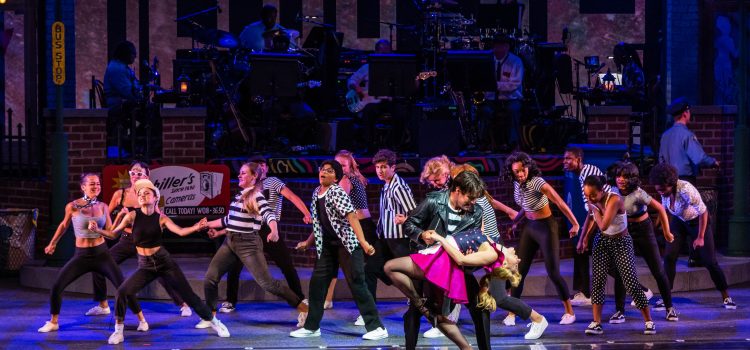By Lynn Venhaus
With the nostalgic glow of scrapbook memories, the toe-tapping and hummable “Smokey Joe’s Café” opened The Muny’s eagerly anticipated 103rd season.
In this spirited localized production of the longest-running musical revue in Broadway history, the creative team imagined a soulful stroll down memory lane, intersecting a generation’s familiar soundtrack with Gaslight Square, one of the city’s most iconic neighborhoods.
And just like that, the U.S.’s oldest and largest outdoor theater demonstrated why it’s an essential part of St. Louis summers.
It had been over 700 days since we were last gathered under the stars in Forest Park – at “Matilda,” to be exact, which ran Aug. 5-11, 2019.
Nobody does what the Muny does, and did we miss it! On Monday, warm-and-fuzzy feelings energized the crowd of 5,956, who collectively exhaled and shared a glorious moment, sprinkled with pixie dust, during a pleasant July evening.
“You’re here. You made it through!” exclaimed Mike Isaacson, executive producer and artistic director, with palpable joy.
One glance at that expansive stage and we were home.

The impressive scenic design by Edward E. Haynes Jr., who was responsible for the bright and playful fantasy world of “The Wiz” in 2019, included realistic facades of Crystal Palace, Jack Carl’s 2¢ Plain (a New York-style deli), Annadel’s Olde-Fashioned Ice Cream Parlor, Smokey Joe’s Grecian Terrace and a Sinclair service station built into the streetscape.
That bygone-era theme continued in Kevan Loney’s video design and Rob Denton’s lighting design, which bathed the nightclub scenes in neon and stardust.
In its heyday, Gaslight Square was the entertainment district in St. Louis – located between Olive and Boyle in the eastern portion of the Central West End. Attracting bohemians, hipsters and the well-heeled, it was known for comedy, dining and dancing. Such rising stars as Barbra Streisand, Lenny Bruce, Woody Allen and The Smothers Brothers appeared in venues there. By the late ‘60s, urban decay took over and people were flocking to the suburbs.
Astute observers will be able to pick out “Easter eggs,” those clever nuggets from the past that mean something to fans — and a major find is shopping bags with the Stix, Baer and Fuller logo. There’s a Sealtest Dairy ad on a back cover – and more blasts from the past.
Never underestimate the emotional connection shared by a live audience, listening to a talented mix of performers sing their hearts out.
As we are all aware of how a global coronavirus pandemic disrupted our lives during the past 16 months, The Muny had been forced to cancel its 102nd season in 2020 – for the first-time ever – and moved five shows to this year, which received the green light when it was deemed safe to do so. Isaacson noted that the performers hadn’t been able to “do what they do” either.
Enter an eclectic cast of nine (five guys, four women), who could be classified as “acting singers” – and their strong interpretations created easily identifiable vignettes during musical numbers. All but three were making their Muny debut.
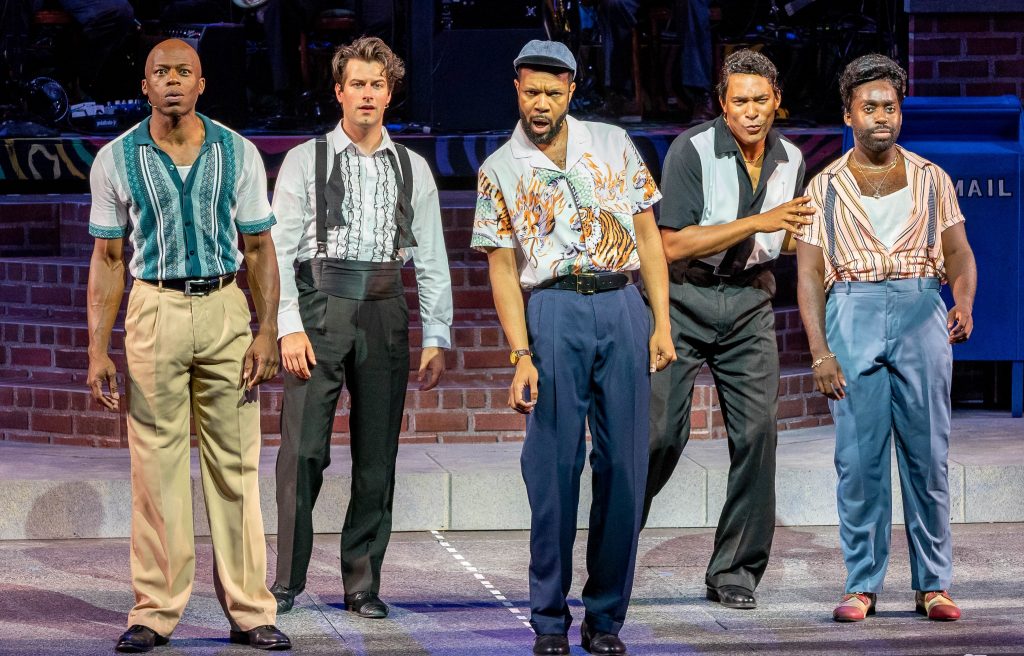
Robust ovations began early, even before they harmonized in the first number “Neighborhood,” and continued through the enduring catalogue of prolific lyricist Jerry Leiber and composer Mike Stoller, for a total of 39 songs, mostly hits from the 1950s and 1960s.
Mutual fans of rhythm-and-blues, Leiber and Stoller collaborated on a pop-rock sound known as “crossover” music back in the day. Their catchy melodies and tender ballads are thread together without a storyline or a chronological order.
From the dance party that is “Baby, that is Rock and Roll” to the classic Drifters’ chart-climber “On Broadway,” the songs vary in mood and tempo.
For the most part, they reflect a more innocent time, especially the amusing novelty songs heard on transistor radios — golden oldies “Charlie Brown,” “Yakety Yak,” “Poison Ivy” and “Love Potion No. 9.”
The assembled artists are a balanced group of pros with Broadway and national tour credits. By the time they united for a moving finale of “Stand by Me,” each performer had a knockout rendition.
First-timer Charl Brown. who was nominated for a Tony for his portrayal of Smokey Robinson in “Motown: The Musical,” showcased his smooth style and wide register with “There Goes My Baby” and “Young Blood.”
Immediately, the audience reacted to Christopher Sam’s rich, deep baritone, and his silky delivery wowed on “Spanish Harlem,” “Loving You” and “Dance with Me.” It’s easy to picture him as Mufasa in “The Lion King” on Broadway.
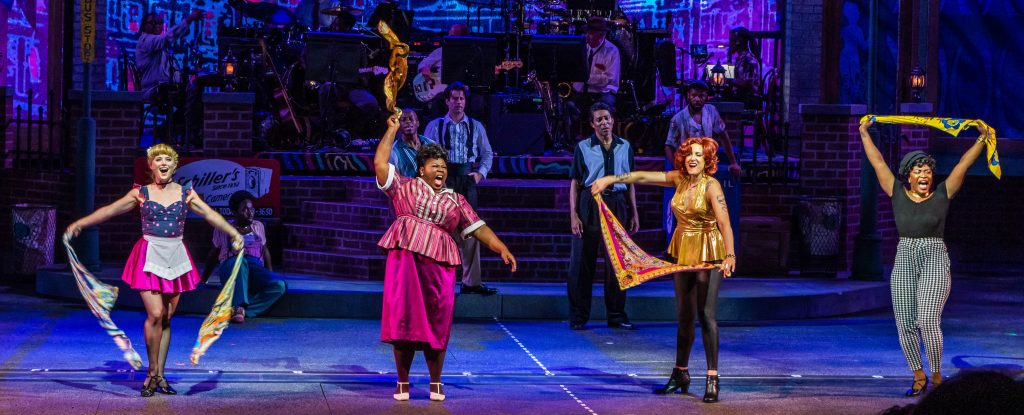
Belter Tiffany Mann was sensational with “Fools Fall in Love” and “Hound Dog,” soaring with the gospel tinged “Saved,” which closed the first act with a flourish. Mann, quickly a favorite, was in “Be More Chill” and “Waitress” on Broadway.
The charismatic Mykal Kilgore brought the house down with a passionate “I (Who Have Nothing).” He was Annas in the Muny’s 2018 “Jesus Christ Superstar” and part of the NBC live television concert version earlier that Easter, and also in the network’s live “The Wiz.”
Excellent dancers Hayley Podschun and Michael Campayno stood out with “Teach Me How to Shimmy.” Podschun, the dance captain, starred as Dainty June in the Muny’s 2018 “Gypsy,” and touched with her sweet solo “Falling.”
Campayno, who played opposite Tony winner Stephanie J. Block in “The Cher Show,” channeled his inner Elvis Presley to lead a peppy “Jailhouse Rock,” and charmed with “Ruby Baby.”
Podschun teamed with Nasia Thomas on a sassy “Trouble.” Thomas, who was in the 2015 “Hairspray” Muny ensemble and played Little Eva in “Beautiful: The Carole King Musical” on Broadway, sang “Don Juan” solo.
In a take-note debut, Dee Roscioli, a long-running Elphaba in “Wicked,” showed versatility in “I Keep Forgettin’” and “Pearl’s a Singer.”. The females all have frisky fun in “I’m a Woman.”
A Smokey Joe’s veteran, expressive Jason Veasey paired with Thomas on “You’re the Boss,” and lead the men in the burlesque homage, “Little Egypt.”
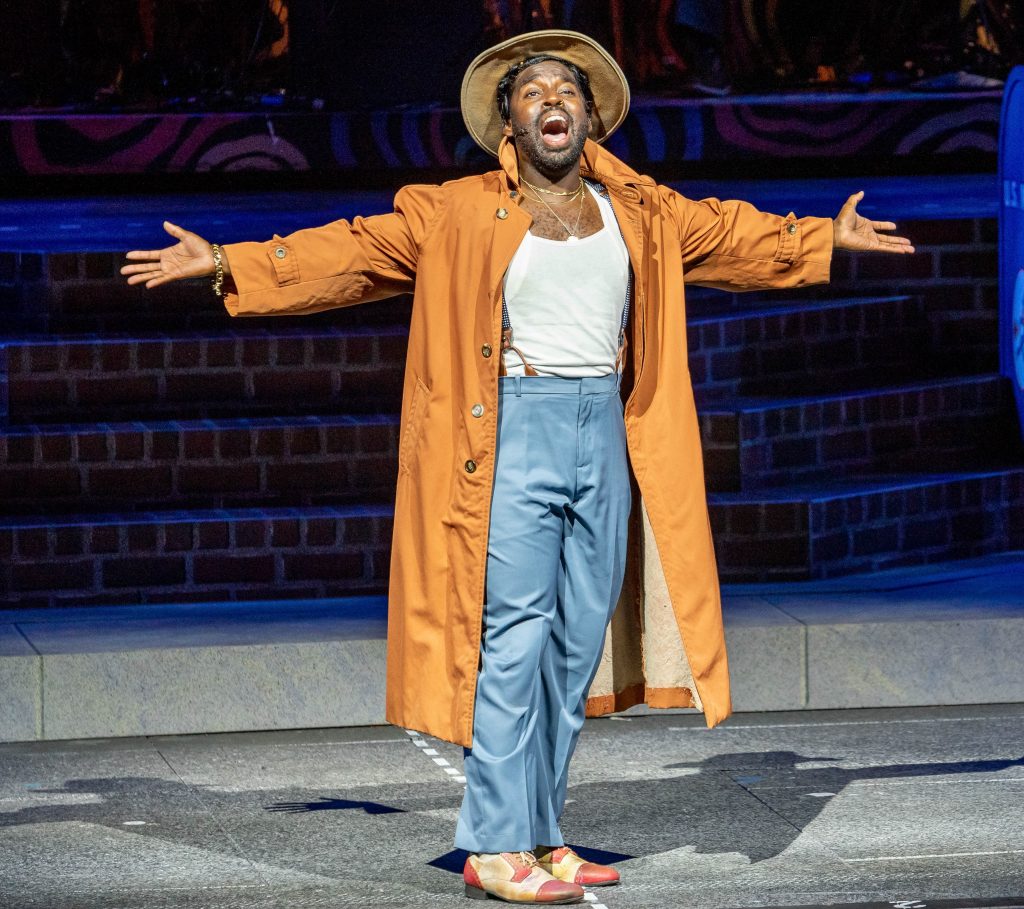
Many of the lyrics, being from a different time decades ago, feature sexual innuendo and set society roles. That means it is preferable for more mature audiences, not the wee ones.
Music Director Abdul Hamid Royal, a Tony Award nominee and NAACP Image Award winner for “Five Guys Named Moe,” nimbly conducted the skilled musicians placed on stage, initially behind a storefront and then in plain view during the second act.
Choreographer Josh Walden designed the movements based on original choreography by director Marcia Milgrom Dodge, with whom he has worked before. He wove in the buoyant Muny Teen youth ensemble with aplomb.
Dodge, a frequent Muny collaborator, had helmed “Smokey Joe’s Café” in Chicago, winning a Jefferson Award. Her vision here added oomph to the characters’ stories, and the ensemble seamlessly slipped into specific archetypes.
Costume designer Sully Ratke created characters’ backstories with a keen eye for vintage wardrobes, and the retro apparel captured their personas, especially snazzy hats. Their looks were accented with spot-on wig design by Kelley Jordan.
The sound design by John Shivers and David Patridge was crisp and did not have any noticeable issues.
At an estimated run time of two hours, 11 minutes, the Tony-nominated musical from 1995 zipped along in swift fashion.
Those who like a beefier story with their musical interludes will not be satisfied by the structure, but if you expect a concert-type experience, then you know what is in store.
What is surprising is how the elements all came together to elevate a conventional revue into a more layered theatrical experience. By expanding on what’s considered routine entertainment, the show — directed and performed with verve — is a cut above the ordinary.
Projecting genuine affection for the material and each other, this cheerful cast and splendid creative team achieved its shining moment. And voila! A community was reborn and welcomed back.
I will never take this tradition for granted ever again.
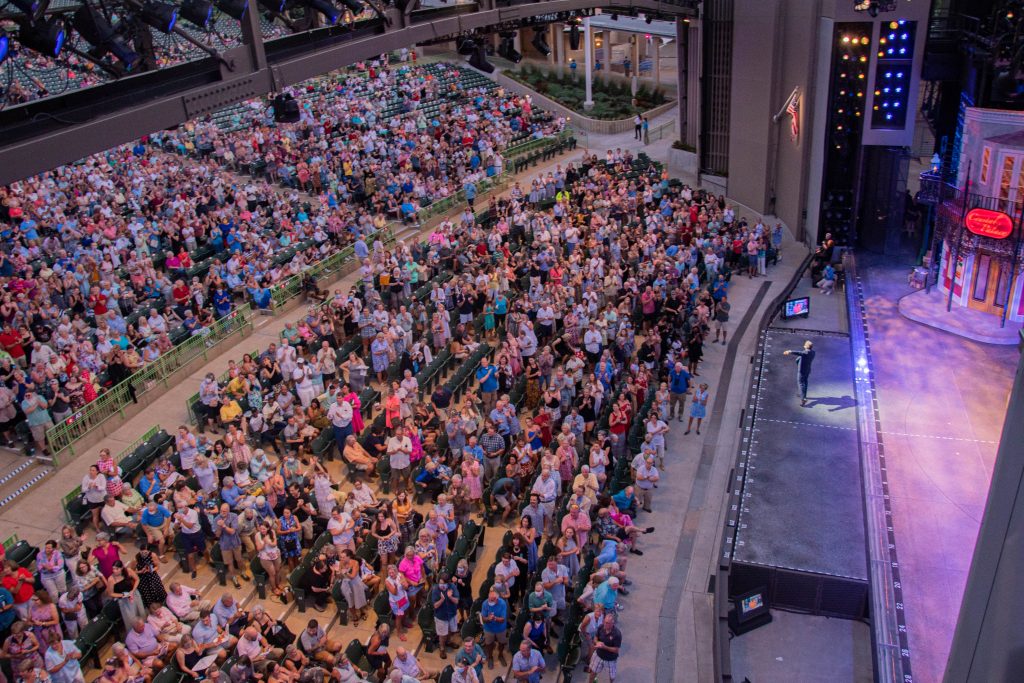
A Muny premiere, “Smokey Joe’s Café” opened July 26 and runs through Sunday, Aug. 1 at 8:15 p.m. on the outdoor stage in Forest Park. Emerson is the 2021 season sponsor.
For more information, visit www.muny.org. For tickets, visit muny.org or call (314) 361-1900 ext. 1550.
To stay connected virtually and to receive the latest updates, please follow The Muny on their social media channels, including Facebook, Instagram and Twitter.
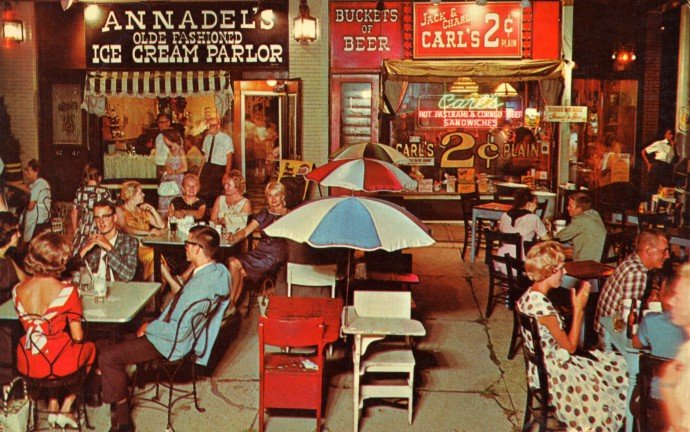
Muny Photos by Phillip Hamer.

Lynn (Zipfel) Venhaus has had a continuous byline in St. Louis metro region publications since 1978. She writes features and news for Belleville News-Democrat and contributes to St. Louis magazine and other publications.
She is a Rotten Tomatoes-approved film critic, currently reviews films for Webster-Kirkwood Times and KTRS Radio, covers entertainment for PopLifeSTL.com and co-hosts podcast PopLifeSTL.com…Presents.
She is a member of Critics Choice Association, where she serves on the women’s and marketing committees; Alliance of Women Film Journalists; and on the board of the St. Louis Film Critics Association. She is a founding and board member of the St. Louis Theater Circle.
She is retired from teaching journalism/media as an adjunct college instructor.

